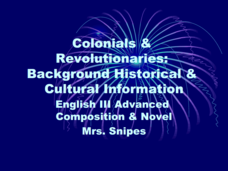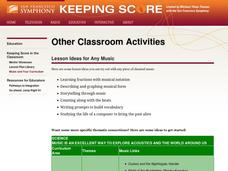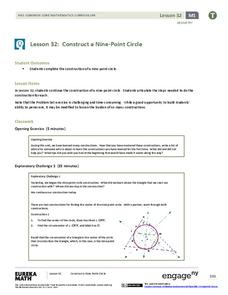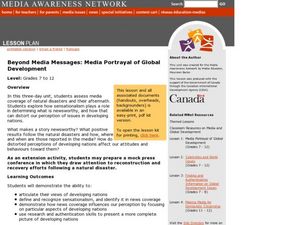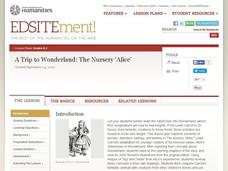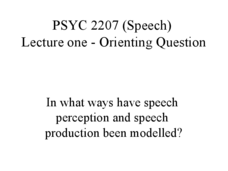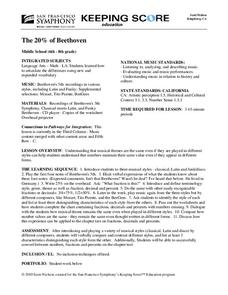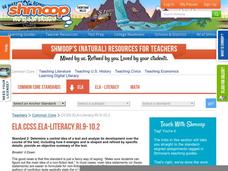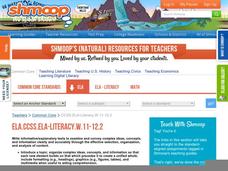Curated OER
Paradise Lost: Anticipation Guide
To set the stage for reading Paradise Lost, class members compete an anticipation guide containing statements that connect to themes in Milton's epic poem.
Curated OER
Colonials & Revolutionaries: Background Historical & Cultural Information
The four major trends of the 18th century (The Enlightenment, the Great Awakening, British global ambitions, and economic disagreements) are the focus of a PowerPoint that places in context such influences as deism, mercantilism,...
National Center for Case Study Teaching in Science
To Boldly Go, or Not
Here is a different way to combine social studies and science. Have your high schoolers read a passage about the 2004 vision for space exploration and then discuss the practicality, costs, and reasons for returning to the moon. Then, the...
San Francisco Symphony
Lesson Ideas for Any Music
Music is a wonderful tool you can add to enhance the learning process for every subject. Here is a list of music selections that are categorized by subject, along with some neat teaching suggestions. You'll find songs suited to...
Curated OER
Lesson Three: Prepositions
Learning prepositions can be tricky in any language, and English is no exception! Try out the activities described here to help your English language learners grasp the difference between in and on and through and by. After a game of...
Curated OER
Lesson Five: Introduction to Auxiliary Verbs
If you are interested, you could try out this lesson on auxiliary verbs. Class members get the chance to discuss the difference between can and could in-depth before viewing a presentation that breaks down several auxiliary verbs. After...
Maine Content Literacy Project
Introduction to Literacy Criticism
As learners continue to examine a short story of their choice, they take some time to look at analysis completed by others on the same story. In the eleventh lesson in a series of fourteen, pupils explore various sites for literary...
Maine Content Literacy Project
Exploring Text with the iMovie Application
Get your class going on one of the final assessments for a unit on short stories by introducing iMovie and its main features. In this tenth lesson in a series of fourteen, pupils take some time to explore iMovie before conducting an...
EngageNY
Construct a Nine-Point Circle
There are an infinite number of points on a circle; can you find nine of them? After putting together a nine-point circle, pupils use constructions and their knowledge of triangle segments to determine the center of the circle. Learners...
Curated OER
Human Rights And Refugees: The Right To Asylum
Students read the Universal Declaration of Human Rights, define asylum and identify when people have the right to asylum. They examine specific cases of asylum in recent times and consider some of the difficulties refugees face.
Curated OER
Beyond Media Messages: Media Portrayal of Global Development
Students discuss global development and create a graphic representation of the discussion. In this media analysis lesson, students deconstruct disaster coverage by reading articles and identifying missing information. Students research...
Curated OER
Building Vocabulary
Decode and acquire new vocabulary! Readers use new vocabulary in their writing and use synonyms to determine meanings. Visual learners label pictures and group words together to increase understanding.
Curated OER
A Trip to Wonderland: The Nursery "Alice"
Primary learners explore elements of wonder in The Nursery "Alice" by Lewis Carroll. They analyze the plot point after listening to the text. Next, they describe the imagery in various works of children's literature using the given links...
Curated OER
PSYC 2207 (Speech): Lecture One
A great way to introduce a speech pathology or psychology class, this lecture takes students through various theories on speech perception and speech production. Students will find the information applicable and easy to digest, and...
San Francisco Symphony
The 20% of Beethoven
Compare Beethoven's fifth symphony to latin music and disco. Learners will listen to and discuss the elements found in the first part of Beethoven's composition. They'll then look for the same elements in Tito Puente and Bee Gees songs....
Shmoop
ELA - Literacy.CCSS.ELA-Literacy.RST.9-10.6
Key to understanding scientific or technical texts is identifying the underlying question the author is attempting to answer. Provide your young scientists with an opportunity to practice identifying these questions and the procedures...
Schmoop
ELA.CCSS.ELA-Literacy.RI.9-10.2
Although the ideas on how to implement the skill RI.9-10.2 are lacking, the assessment would work well for challenging learners to summarize, and identify the main ideas of presidential speeches that are of similar topics. One could use...
Shmoop
ELA.CCSS.ELA-Literacy.W.11-12.2
Practice and fine-tune your learners' writing skills for Common Core standard W.11-12.2 with a plan that explains how to incorporate the McCarthy Hearings into their reading of The Crucible. It offers solid advice for students on how to...
Shmoop
ELA.CCSS.ELA-Literacy.RL.11-12.5
What would happen if I structured this review by beginning in the middle of it? Or by flashing back to the dinner I had last night that gave me bad heartburn, and then transitioned into how the lingering burn of acid seeped into my...
Curated OER
Start-Stop Counting
Similar to the game duck, duck, goose, assemble your class in a circle. Choose a number range (within ten numbers) begin walking around the circle counting and select a child by tapping her. The child then picks up the counting sequence...
Foundation for Water & Energy Education
What is the Water Cycle? Activity A
Hydrologists create a concept map about how water is used and a sentence strip defining water and describing its unique properties. Small groups work together to fill a small milk carton and compute the mass of water inside. The next...
Curated OER
Decisions: Action or Apathy
Students examine the issues of action versus apathy as related to life pressures, values, consequences and career decisions. They read poetry, short stories and plays and respond to issues personally, critically and creatively.
PBS
Primary Sources
Students see how to use primary and secondary sources to investigate history. Whether it is a photograph, book, map, letter, postcard, newspaper, or official document, students can use sources to reconstruct and relive history.
Curated OER
Got a Problem? Let's Solve It! Lesson 1:
Students investigate how problem solving skills contribute to philanthropy. In this animal welfare lesson, students use problem solving skills to make suggestions about how to solve an issue regarding the humane treatment of an animal.
Other popular searches
- Articulation Therapy
- Articulation Games
- Speech Articulation Therapy
- Articulation Skills
- Articulation Therapy for R
- Articulation Activities
- Concert Band Articulation
- Articulation Abilities
- Speech Articulation
- Articulation Therapy K
- Articulation Games R
- Articulation Therapy for S

